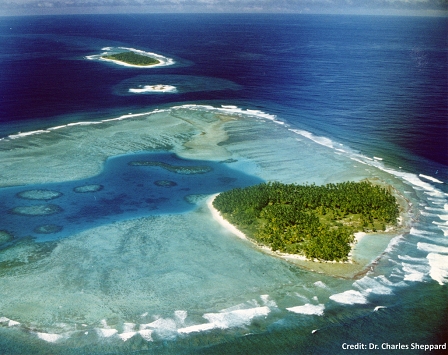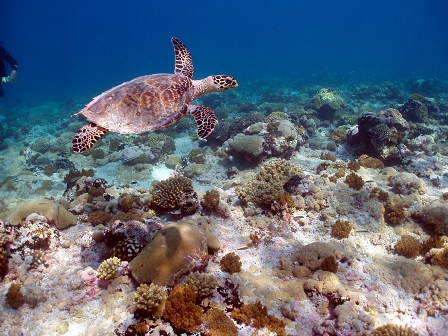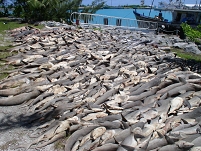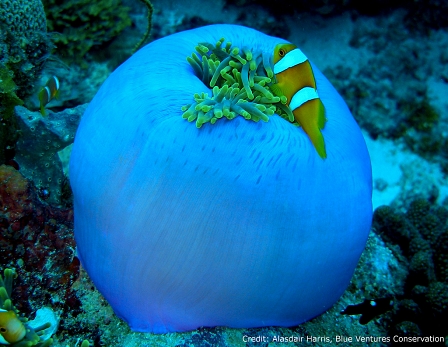Erstellt am: 28. 9. 2010 - 10:47 Uhr
A Maritime Eden
"The water is so clear that the corals grow much deeper that anywhere else because the light can penetrate so far. Over half the healthy coral in the Indian Ocean is found there, and it’s teeming with life".
The way that Jay Nelson, the director of Global Ocean Legacy, describes the Chagos archipelago is so bewitching, it reminded me of the passage in Alex Garland’s The Beach, where the two American students Zeph and Sammy lyrically describe this paradise off the coast of Thailand as a pristine world of “waterfalls surrounded by thick jungle.”
But the Chagos Islands are real. Indeed the series of tropical islands and unspoiled coral reefs, have been described as “the most pristine tropical marine environment on Earth” and this year they became host to the world’s largest marine reserve - a 545,000 square km area that Nelson describers as a “vital biodiversity hotspot”.

pewmedia
The reserve is host to the world's biggest living coral structure - the Great Chagos Bank - and is a home to over a thousand species of fish, including 60 endangered species living the coral reefs. It’s a seascape of underwater mountains and an oceanic abyss. It’s a breeding ground for turtles and sea birds and Nelson says it is one of the few areas visited by Charles Darwin in the 1860’s that Mr. Evolution would have still recognized today.
Nelson, whose group has been pushing for greater protection for the world's oceans, has called the cordoning off of one of the world's richest marine ecosystems a "major breakthrough." The idea of a marine reserve is to prohibit activities such as industrial fishing and deep-sea mining.

pewmedia
A decade after the Millennium Summit in Rio promised to push for ecological sustainability, our oceans desperately need better protection. They face an onslaught such as rampant overfishing - effecting most of the major commercial catches. The plight of cod and tuna has been well reported, but last week on Reality Check we heard a victim of shark attacks, Debbie Salamone, passionately arguing against the folly of shark-finning, a cruel practice that kills 72 million sharks a year and has pushed a third of all shark species to the verge of extinction.

pew media
Over-fishing is just one dimension of the crisis. There are also threats from other direct human influences including agricultural run-off and industrial pollution, oil exploration and spills and the laying off underwater cables and pipe-lines. And there is an even more significant threat from the side-effects of global warming.
The warming of the oceans is bleaching the corals and killing off sea-life. And as carbon in the atmosphere increases, our oceans are become increasingly acidified (dissolved CO2 reduced the pH of the water) which detrimentally affects the shells of the tiny marine life to that make up a much of the lower echelons of the oceanic food chain. "That has incredible implications for the health of our oceans," says Nelson.
2010 is the UN International Year of Biodiversity, find more on biodiversity here:
At the moment around 0.36% of our oceans are protected - a figure that Nelson describes as "tiny". Global Ocean Legacy works in partnership with local citizens and governments to help establish highly protected marine reserves. An area north-west of the Hawaiian islands was designated a marine reserve four years ago, the Chagos followed this year and now Global Ocean Legacy is negotiating over the Australian coral sea and areas off New Zealand, Chile and Antarctica.
Everywhere they are active they have faced fierce opposition from interest groups. The creation of the Chagos protection zone will, for example, involve a loss of nearly one million Euros a year in lucrative tuna fishing licences.
The wonder of the Chagos archipelago
Greenpeace would like to see 40% of the oceans protected (as a reference point, 12% of land is currently protected), but for the moment Jay Nelson and Global Ocean Legacy are happy with the smaller triumphs like the creation of the Chagos marine park.
Even this baby step has come under immediate threat. The area is a British protectorate and the policing of the area looked likely to fall victim of the new conservative UK government’s spending cuts before Swiss billionaire Ernesto Bertarelli, a yachting enthusiast, stepped in.
Meanwhile court cases are pending - the inhabitant of the main island, Diego Garcia was forcibly evacuated by the UK government in the 1960s to make way for a US military base. Some Chagossians claim the marine protected area would "severely jeopardise" any resettlement, because it would prevent them from fishing - their main livelihood and are pursuing the case in the European courts. Mauritius, which has a claim on the islands, complains that it was not properly consulted over the decision.

pewmedia
But despite the mammoth task and the legal complications Jay Nelson is determined to extend the world’s network of protected ocean areas. "Educationally and scientifically," he says, "they are a huge asset for humanity".
As campaigner Tony Jupiter has written "The Chagos protected area could help fish stocks recover from the decades of destructive and unsustainable practices that have caused fish populations to collapse." With human influence minimized, meanwhile, Jay Nelson says that scientists will be able to study how oceans are coping with climate change.
After all, life began in the oceans and we are destroying their natural wealth even before we have catalogued it. Our knowledge about the sea-bed in the greath depths is still very sparing, and everytime researchers manage to get down to the sea mounts of the Chagos they discover dozens of new species.
Nelson says there are doubtless less more species down there as well as chemicals and even the possible keys to drugs of the futures, but sadly "we're destroying them before we even find them."


